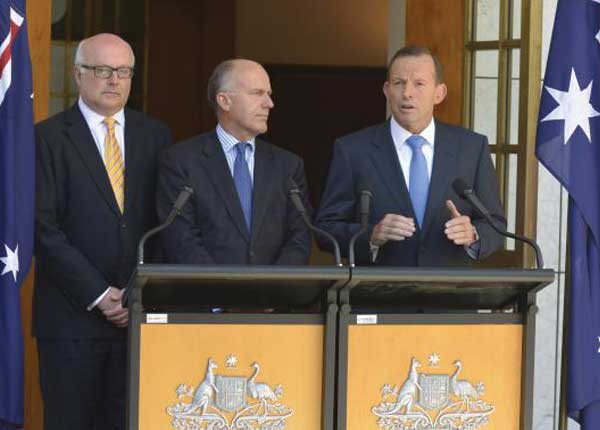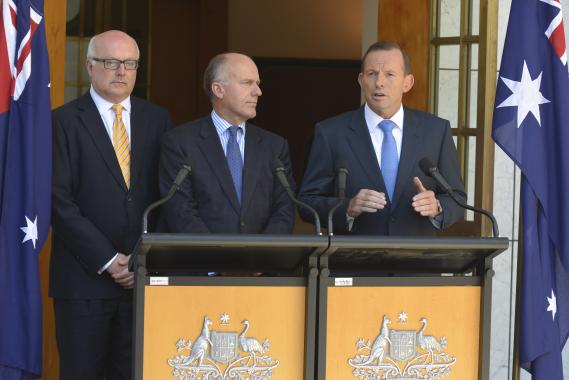

Public Service Minister Senator Eric Abetz could be forced to cede important tactical ground in the Abbott government’s hardline battle with the Community and Public Sector Union over the renewal of the federal bureaucracy’s main industrial instrument that lapses in June.
As the clock ticks down to the end of financial year expiry date, expectations are growing among some senior bureaucrats that the government is poised to offer a pay increase of between 1.5 to 2.5 per cent to as part of horse trading over future wages and conditions, a significantly more conciliatory position than a previous 0 per cent offer that had been flagged by Senator Abetz.
According to credible reports in The Canberra Times re-published by the CPSU, the public service union could succeed in legally forcing the government to commence formal workplace negotiations through agency heads by using a clause in the Fair Work Act.
The reports say the government will release its bargaining framework on Friday 28th March.
“As recently as this Tuesday the Minister [Senator Abetz] was not prepared to tell the CPSU when the framework would be released,” the union said in a bulletin to members.
“After months of stone-walling and delays from the Government, this is a significant win. It demonstrates what CPSU delegates can achieve by working together. It also sets us up well for what will be a challenging but rewarding bargaining campaign.”
Having launched a major recruitment drive to on the back of fears over wages and conditions, the CPSU is pitching it’s breakthrough in bargaining negotiations as “an opportunity to safeguard the things that matter at work.”
“We know CPSU members are concerned about job security, employment conditions, pay and workplace rights – and our claim is focused on these issues,” the union said.
Industrial chest beating aside, the timing of the public sector pay negotiations is a major headache for the Abbott government because the recasting of the main industrial instrument falls immediately before the release of Treasurer Joe Hockey’s pivotal first Budget in early May.
A key issue for the government is that it not only has to factor any future pay rises into the forward Budget estimates, but also keep a reserve of money on hand to pay out any large scale redundancies and entitlements that would flow from a major downsizing of the public service.
The government, through the Australian Public Service Commission, had previously flagged that that the funding equivalent of between 18,500 and 23,500 jobs would have to be found to make up for a pay rise of 4 per cent over three years that the CPSU had put on the table as part of its log of claims.
Added to existing estimates of as many 26,500 jobs needing to be axed through a combination of the application of Labor’s reviled ‘efficiency dividend’ and the Abbott government’s pre-election pledge to remove 12,000 positions the total number of jobs potentially on the chopping block rounds out to a neat 50,000.
Against a public service of around 160,000 employees, the idea that 50,000 staff can be let go is being privately dismissed as utterly unworkable by both bureaucrats and government hard heads who concede it is simply too deep for the public service to actually function.
Former senior public servants have indicated to Government News that there is an growing sense that the use of hardball tactics and rhetoric with the CPSU by the Abbott government could have unintentionally painted the government and the APSC into a corner.
One source suggested that it was implausible and psychologically counter intuitive to put the offer of a cut to pay and conditions to public servants ahead of a major labour shedding round.
Firstly, there was simply no incentive in terms of job security to trade off against any reduction to conditions or pay the source said. Secondly, in the event public servants felt they would “get the bullet” the natural reaction would be to dig in to ensure existing entitlements were not diminished prior to a forced termination payment.
The source suggested that many more mature public servants, who would find it more difficult to get state government or private sector jobs than younger and more mobile staff, were now “hell bent on capital preservation.”
Meanwhile, retrenchments continue to flow from the APS at pace. Another 200 public servants will leave the Department of Industry as previous cuts continue to bite ahead of the next round of layoffs that are expected to be triggered following the release of the National Commission of Audit.
Comment below to have your say on this story.
If you have a news story or tip-off, get in touch at editorial@governmentnews.com.au.
Sign up to the Government News newsletter
